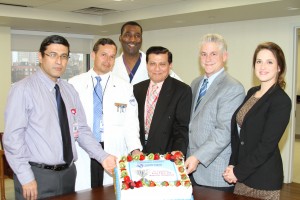 In 2013 Jamaica Hospital Medical Center conducted research with the goal of identifying key health issues within communities served. After a careful and thorough analysis, it was discovered that breastfeeding rates in service communities were at a concerning low. The numbers indicated that several neighborhoods, particularly those in Southwest Queens, ranked among the lowest in New York City. This prompted the hospital to include breastfeeding in its Community Service Plan and focus on increasing the number of mothers who breastfed exclusively after giving birth.
In 2013 Jamaica Hospital Medical Center conducted research with the goal of identifying key health issues within communities served. After a careful and thorough analysis, it was discovered that breastfeeding rates in service communities were at a concerning low. The numbers indicated that several neighborhoods, particularly those in Southwest Queens, ranked among the lowest in New York City. This prompted the hospital to include breastfeeding in its Community Service Plan and focus on increasing the number of mothers who breastfed exclusively after giving birth.
Jamaica Hospital has since executed several community education and outreach initiatives such as Centering Pregnancy and support groups to inform families of the importance of breastfeeding. The hospital has partnered with the New York City Department of Health and Mental Hygiene (NYC DOHMH) “Latch on NYC” initiative and the Queens Breastfeeding Alliance to expand its reach. In the initial stages of inception only 2% of infants born at the hospital were exclusively fed breast milk but this number has now grown to over 24%. Through this advancement, other objectives that are consequential to breastfeeding such as childhood obesity and the development of some cancers in women will be addressed.
Lactation consultant Paula Utilla, administrator Mitchell Cornett as well as other members of the Ob/Gyn department coordinated a successful seminar featuring world- renowned author and lactation consultant Catherine Watson-Genna. The seminar educated staff and patients about breastfeeding problems related to tongue tie.
Tongue tie is a congenital condition which occurs in an estimated 5% of newborns and restricts the tongue’s range of motion. This restriction is caused by an abnormally thick and short lingual frenulum. Ms. Watson-Genna presented her research project- using ultrasound to examine tongue movements of babies with tongue-tie before and after frenotomy (procedure which releases the frenulum). Other speakers included Jamaica Hospital’s own Frances Perez-Hernandez, doctors Silvestro Iommazo, Ajey Jain and Steven R. Inglis.
Jamaica Hospital heavily promoted breastfeeding by producing literature, program posters, webpage ads and social media marketing, but the ribbon that tied this all together was a well-received news segment on NY1. The segment featured baby Germosen, who received a frenotomy from Dr. Iommazo and is now happily breastfeeding.
To end the year in a bang, the hospital was recognized by the New York City Department of Health and Mental Hygiene Breast Feeding Collaborative for achieving the highest score improvements in the baby-friendly core measures over a six month period.
The year 2014 in review has been successful for the hospital’s breastfeeding initiative. The numbers are continuing to increase and more families are aware of its importance. Jamaica hospital’s objectives for 2015 include, continuing to increase the exclusive breastfeeding rate, enrolling 500 women in the Centering Pregnancy program and enrolling more mothers into the off-campus breastfeeding peer support group.
 The prestigious team of surgeons at Flushing Hospital Medical Center is moving full speed ahead in performing surgeries with the assistance of the da Vinci surgical robot. This specially trained group of physicians has successfully completed an impressive 100 plus procedures in just a few months.
The prestigious team of surgeons at Flushing Hospital Medical Center is moving full speed ahead in performing surgeries with the assistance of the da Vinci surgical robot. This specially trained group of physicians has successfully completed an impressive 100 plus procedures in just a few months.









